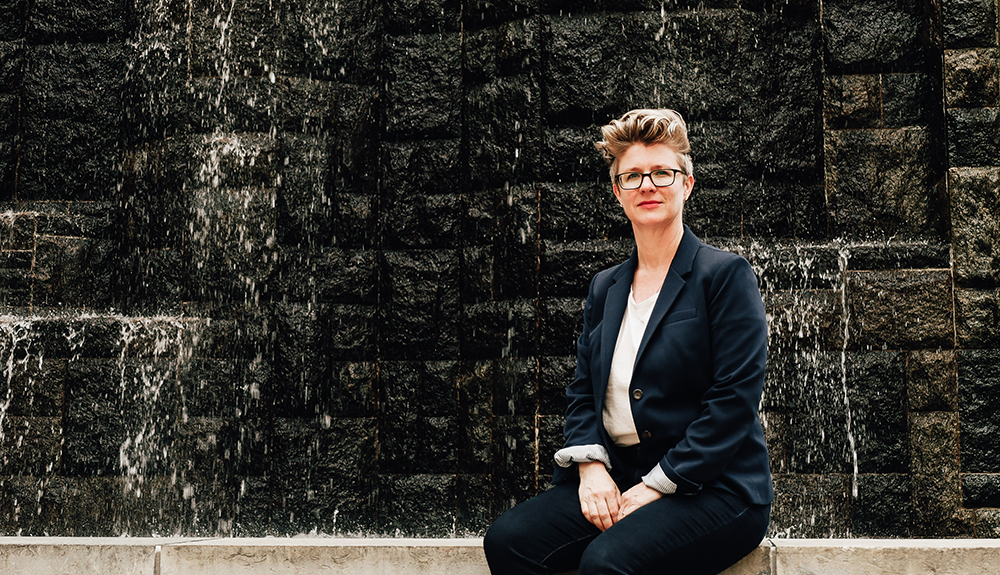Meet Amanda B. Lowe, Ph.D., Assistant Professor of Psychology and Director of the Psychology Clinic Friday, September 24, 2021

"My goal for my students, whatever level they are on, is for them to come out on the other side with the capacity to think about very complex problems with nuance and to be able to make decisions that are enfranchising and support the dignity of all human beings."
New to the Department of Psychology this semester is Amanda B. Lowe, Ph.D., an assistant professor with experience in clinical practice, entrepreneurship and research. She previously taught at Point Park in 2011, 2012 and 2016.
Lowe is the founder and principal of Clarity in Context, LLC, a consultancy that provides professional reflective services that facilitate healing, learning and personal and professional development. She is also founder and principal of Get Into Therapy, which helps psychotherapy clients, their loved ones and other advocates to navigate the mental health system by providing education, support and locating accessible treatment.
In the Q&A below, learn about Lowe's teaching style and the real-world experience she brings to the classroom.
Learn more about Point Park's Psy.D. program at our virtual open house on Oct. 13 at 5 p.m. RSVP online.
What drew you to Point Park?
My relationship with the Department of Psychology goes back to when Brent Dean Robbins first started working here. He’s a colleague of mine and a fellow alumni from Duquesne University. We are both human science-oriented psychologists, and that’s very unusual. Point Park actually has a very unusual psychology department. The kinds of things that I’m interested in researching and teaching, like phenomenology, you can’t really do that anywhere else. Point Park is a very special place.
Dr. Robbins, Matthew Allen, Robert McInerney – all of these professors are people I like and respect very much and have wanted to work with for many years, but I wasn’t really ready to take an academic position after finishing graduate school. I wanted to do things in the field out in the world, and then, when there was the opportunity to come back, it was the right time.
Describe your approach to teaching.
Being a human being and thinking about human beings is a complex endeavor and easy to oversimplify because we are looking at ourselves. It’s difficult to look at ourselves with any kind of objectivity. I really enjoy helping students learn how to think about those concepts. When I'm working with undergraduates, it’s introductory. When I’m working with graduate students, it’s about delving into the finer points and the nuances.
What I like to do is create a learning environment where we can dig in, have things get ambiguous, have conflicts and opinions and learn to engage with the difficulty that is psychology in such a way that everybody learns how to think better. My goal for my students, whatever level they are on, is for them to come out on the other side with the capacity to think about very complex problems with nuance and to be able to make decisions that are enfranchising and support the dignity of all human beings.
How do you incorporate your real-world experience into your classes?
In terms of classes, I enjoy talking with my students, particularly doctoral students, about how they can take their degrees and do things in the world that include psychotherapy but also go into areas like program development. Many students are interested in trying to create some kind of innovative approach to the practice of professional psychology. Talking with them about how you actually do that in a very pragmatic way is one of the most significant contributions that I can make. As the director of the psychology clinic, my experience with entrepreneurship really goes a long way in helping students think about how organizations function and how to create a healthy working environment.
What advice do you have for students?
One of the most important skills in life is learning how to be honest with yourself. It’s challenging to do because it means you have to allow yourself to be disillusioned about yourself and other people, but ultimately it brings a great deal of joy and strength. Getting into the habit of being honest with yourself is probably one of the most foundational things to having a successful life as a human being. When you get really good at it, life starts to become very beautiful.

